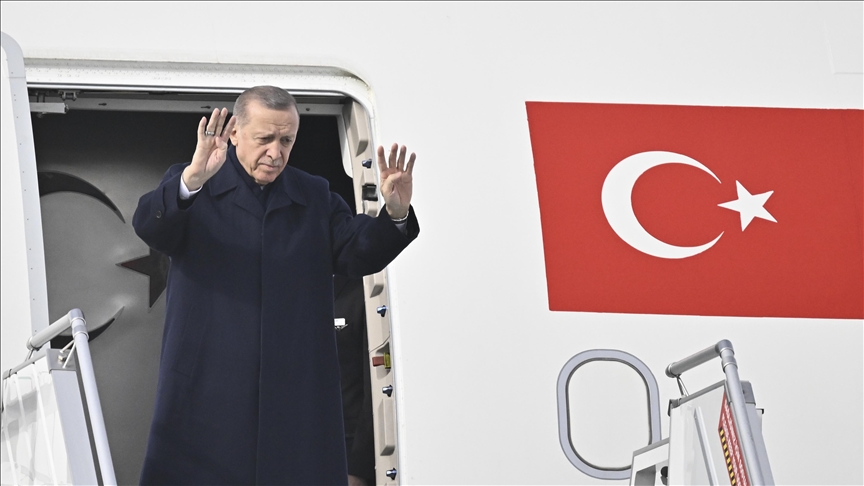OPINION - Diplomatic reset: What does President Erdogan's Cairo visit mean for Türkiye-Egypt ties?
Türkiye and Egypt's stance and dialogue on Palestine are crucial for humanitarian aid, mediation, and the future of a sovereign Palestinian state, as well as post-conflict development projects and reconstruction efforts

- Türkiye and Egypt's stance and dialogue on Palestine are crucial for humanitarian aid, mediation, and the future of a sovereign Palestinian state, as well as post-conflict development projects and reconstruction efforts
- Erdogan's visit signifies not just a diplomatic gesture but also a strategic move toward regional stability and cooperation
- The author is publication coordinator and columnist for Turkish Daily Sabah.
ISTANBUL
After a decade of strained relations between Ankara and Cairo, the prospect of normalization looms large as Turkish President Recep Tayyip Erdogan plans a significant visit to Egypt on Feb. 14.
Turkish-Egyptian relations soured following the 2013 military coup that ousted Mohamed Morsi, Egypt's first democratically elected president. Following Ankara's condemnation of the coup, diplomatic ties got severed.
Changing dynamics of relations between Türkiye and Egypt
Subsequently, while bilateral and economic relations suffered, both nations became regional rivals, particularly in conflicts like Libya, where they supported opposing factions. Cairo backed the Libyan National Army (LNA), while Ankara supported the United Nations (UN)-recognized Government of National Accord (GNA). In 2020, tensions escalated with disputes over East Mediterranean gas exploration and maritime boundaries, leading to confrontations at different levels, including verbal exchanges and media propaganda. The prolonged period of strained ties has arguably been more extended than necessary, considering lost opportunities for both nations in various realms. Analyzing this historical context and international relations in general, however, requires an understanding of the conditions and dynamics of the time.
However, a new chapter unfolded in 2021, marked by exploratory talks that gained momentum after the handshake between Turkish President Recep Tayyip Erdogan and his Egyptian counterpart Abdel Fattah al-Sisi at the 2022 World Cup in Doha. This dialogue was intensified after the deadly February earthquakes in Türkiye and is set to culminate during President Erdogan's upcoming visit.
Cairo visit comes at a difficult time for the Middle East
The timing of the visit coincides with the international community witnessing Israel's massacre and atrocities against children, women and civilians in Gaza since Oct. 7, resulting in spillover effects in a broader region involving Lebanon, Syria, northern Iraq, and the Red Sea, with the involvement of global powers and regional players.
During Erdogan's visit, a crucial topic on the agenda will be exploring opportunities for joint mediation efforts in regional conflicts. Both Türkiye and Egypt, with their large populations and military capabilities, hold pivotal roles in regional balances. Their unified stance and dialogue on Palestine are crucial for humanitarian aid, mediation, and the future of a sovereign Palestinian state, as well as post-conflict development projects and reconstruction efforts.
Moreover, their relationship contributes to the balance in Gulf dynamics and the African region, with potential positive outcomes for the stability of countries like Libya, Sudan, and Ethiopia. Additionally, the restoration of ties with Cairo, coupled with Ankara-Athens rapprochement efforts, could positively influence the East Mediterranean dispute.
Indeed, Egypt and Türkiye, remnants of the Ottoman Empire, share a rich diplomatic, economic, cultural, and social relationship that has evolved over the years. The ongoing normalization will no doubt further strengthen ties in these areas.
Rebuilding economic and security relations
Anticipated areas of collaboration in the new period include efforts to rebuild economic ties and increase bilateral trade, with a current volume of $10 billion and a goal to reach $15 billion in the next 5 years. Turkish investment in Egypt stands at nearly $2 billion, with contractors working on projects valued at about $1.2 billion. The further strengthening of existing trade ties through new agreements, diversifying mutual investments, and establishing projects in transportation and energy will foster economic collaboration. Additionally, tourism and cultural exchange, focal points for both nations, will enhance people-to-people connections.
Defense and security cooperation represent another significant area for improvement. Both countries heavily invest in defense development, with Turkish drones and domestically manufactured defense products earning global acclaim. The Turkish president has spent significant effort for his vision of self-reliant defense industry, spanning from unmanned combat air vehicles (UCAV) to fighter jets and warships. Domestically produced defense products have proved their success not only domestically in the fight against terrorist groups, but also in conflict zones such as Syria, Libya, South Caucasus and in Ukraine.
As such, exchanges in defense industry cooperation will be a key focus during Erdogan's visit. Turkish Foreign Minister Hakan Fidan has already announced a common agreement on selling Turkish drones to Egypt, likely including drones developed by Baykar, such as Bayraktar TB2 which can fly for more than 20 hours at 27,000 feet, can carry a load of up to 120 kilograms and weighs only 650 kilograms. Baykar has exported its drones to more than 30 countries to date.
In conclusion, of course, the normalization's positive impact will not be limited to the above mentioned areas and will extend beyond. It will contribute significantly to minimizing the spillover effect of conflict in Gaza amid major security risks and instability in the region. The dialogue and synchronization between Ankara and Cairo hold the potential to realize the full potential in areas of bilateral cooperation, benefiting people-to-people harmony and the economic interests of both sides. Erdogan's visit signifies not just a diplomatic gesture but also a strategic move toward regional stability and cooperation.
*Opinions expressed in this article are the author’s own and do not necessarily reflect the editorial policy of Anadolu.
Anadolu Agency website contains only a portion of the news stories offered to subscribers in the AA News Broadcasting System (HAS), and in summarized form. Please contact us for subscription options.







